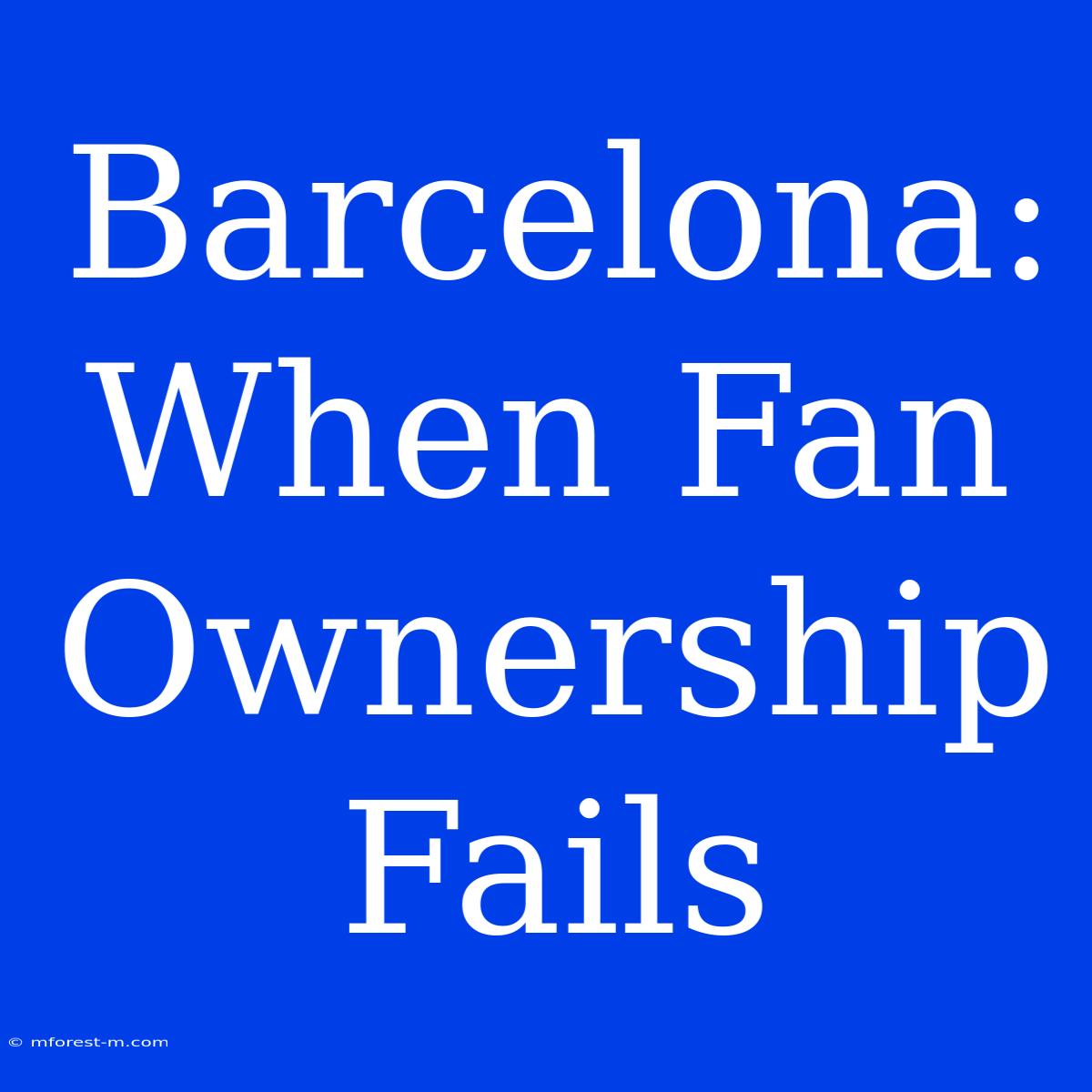Barcelona: When Fan Ownership Fails
Is fan ownership the golden ticket to club success? Barcelona, a club renowned for its passionate fanbase and "Mes Que un Club" mantra, stands as a cautionary tale. Despite boasting a democratic structure with over 140,000 socios (members) holding voting rights, the club has faced significant challenges in recent years, highlighting the complexities of fan ownership. Editor Note: Barcelona's fan ownership model has come under scrutiny in recent years, prompting a deeper look into the effectiveness and limitations of this often-lauded structure.
This topic is crucial because it delves into the real-world implications of fan ownership, dispelling the often-romanticized notion that it automatically leads to success. It forces us to examine the intricate interplay between fan passion, club management, and the complex financial realities of modern football. This article will explore the challenges Barcelona faces, analyzing the factors hindering its progress and offering insights into the future of fan ownership.
Our analysis involved combing through extensive reports, news articles, and expert opinions on Barcelona's socio-economic landscape. We examined the club's financial performance, transfer strategies, and its relationship with socios, identifying key areas where fan ownership has struggled to deliver expected results.
Key Takeaways
| Challenge | Description |
|---|---|
| Financial Instability | Barcelona grapples with mounting debt, a consequence of inflated transfer spending and a stagnant revenue stream. |
| Decision-Making Dilemmas | The socio's collective decision-making process can be slow and susceptible to populist pressures, potentially impacting strategic choices. |
| Lack of Professional Management | The club's history of appointing charismatic figures rather than experienced managers has sometimes led to instability and subpar results. |
| Internal Divisions | Differences in opinion among socios, particularly concerning player recruitment and transfer strategies, can create internal friction and hinder progress. |
Barcelona: A Case Study
The socio's role at Barcelona is central to the club's identity. These members enjoy the right to elect the president and vote on key decisions, such as player signings and stadium renovations. While this structure fosters a sense of ownership and democratic spirit, it has also presented its fair share of challenges.
Financial Instability
The Catalan giants have been plagued by mounting debt, a consequence of their ambitious transfer policies and a lack of consistent revenue generation. Barcelona's financial woes have stemmed from several factors, including:
Overspending: The club has consistently pursued expensive players, often overpaying for their services, further burdening its finances.
Lack of Diversified Revenue: Barcelona relies heavily on matchday revenue and sponsorship deals, making it vulnerable to fluctuations in attendance and economic downturns.
Stagnant Revenue: The club has struggled to compete with European giants like Manchester United and Real Madrid in generating revenue from media rights and commercial agreements.
Decision-Making Dilemmas
The collective decision-making process of the socios can be slow and susceptible to populist pressures. While this system ensures democratic accountability, it can also hinder the swift and strategic decisions crucial for success in modern football.
Example: The decision to sign Antoine Griezmann, a popular but expensive player, was a consequence of strong socio support, despite concerns about the club's financial situation.
This highlights the tension between fan sentiment and rational financial management. The socios' desire to see their favorite players on the pitch can sometimes outweigh the financial realities of the situation.
Lack of Professional Management
Barcelona's history is dotted with charismatic figures, such as Johan Cruyff and Pep Guardiola, who have left a lasting legacy on the club. However, the club has also faced criticism for prioritizing charisma over managerial experience.
Example: The appointment of Ernesto Valverde, a highly experienced manager, was followed by his dismissal due to pressure from socios who felt the team lacked a winning style.
This highlights the challenge of balancing fan expectations with the need for long-term strategic planning. The socios, driven by their passion, can sometimes demand quick fixes, hindering the development of a sustainable and successful team.
Internal Divisions
Differences in opinion among socios, particularly concerning player recruitment and transfer strategies, can create internal friction and hinder progress.
Example: The decision to sell Neymar Jr. was met with mixed reactions from socios, with some supporting the move and others criticizing the club's transfer strategy.
These internal divisions can undermine the club's unity and make it difficult to implement long-term plans.
FAQs
Why is Barcelona's fan ownership model failing? Barcelona's fan ownership model is not failing entirely. The club continues to enjoy strong support and a sense of community. However, the model is facing challenges in navigating the complexities of modern football, particularly regarding financial stability and decision-making processes.
What can Barcelona do to improve its financial situation? Barcelona needs to diversify its revenue streams, develop more lucrative commercial agreements, and control its spending on player acquisitions.
Can Barcelona maintain its democratic structure while achieving success? Balancing the socios' desire for democratic control with the need for effective management remains a challenge. The club needs to find a way to reconcile these competing interests.
Tips for Successful Fan Ownership
1. Diversify Revenue Streams: Explore avenues beyond matchday revenue, like media rights and merchandise sales. 2. Strengthen Financial Controls: Establish robust financial management systems and procedures to prevent reckless spending. 3. Focus on Long-Term Planning: Prioritize a sustainable strategy that balances fan expectations with the club's financial realities. 4. Foster Dialogue and Collaboration: Encourage open communication between socios, club management, and stakeholders to bridge gaps in opinion. 5. Invest in Professional Management: Recruit experienced managers and coaches with proven track records of success.
Conclusion
Barcelona's fan ownership model, while celebrated for its democratic ethos, has faced real-world challenges. The club's struggle with financial instability, decision-making dilemmas, and internal divisions highlights the need for a nuanced understanding of the complexities of fan ownership in modern football. While the club seeks to maintain its unique socio structure, finding a balance between fan power and strategic management remains crucial for future success.

